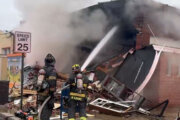
▶ Watch Video: Experts warn U.S. teens are experiencing a mental health crisis
The beginning of the school year can be full of emotions, both good and bad — and a new national survey suggests how many kids are dealing with issues that cause their parents concern.
The survey, conducted online by The Harris Poll on behalf of the On Our Sleeves Movement for Children’s Mental Health, found 71% of American parents say their children experienced challenges last school year.
The top issues identified by parents included:
- Safety concerns at 37%
- Academic challenges, 26%
- Bullying, 24%
- Ongoing pandemic-related social challenges, 24%
- Mental health challenges, 22%
“Between academic struggles, behavioral challenges, increased depression and anxiety, and challenges making social connections, we’ve been hearing firsthand from families about how tough last school year was for many kids,” Dr. Whitney Raglin Bignall, associate clinical director of On Our Sleeves and a pediatric psychologist at Nationwide Children’s Hospital, said in a news release Thursday.
The survey results, collected earlier this month from 585 parents of children ages 3 to 17, closely match what parents anticipated when asked the same question before the last school year.
As the new school year approaches, Raglin Bignall says it’s “crucial to understand how kids are thinking and feeling about returning to the classroom.”
“Checking in and having conversations with them is a simple, yet critical way to help minimize any lingering issues before they turn into even bigger challenges this upcoming school year,” she adds.
This is just the latest research to spotlight issues affecting the physical and mental well-being of students.
Studies have shown some kids have lingering mental health issues following the COVID-19 pandemic, while the frequency of mass shootings raises concerns about physical safety as well as anxiety.
Last year, a Gallup survey showed school safety concerns reached a 20-year high among U.S. parents of students enrolled in grades K-12. It found 44% of adults who participated said they feared for their children’s physical safety at school, while 20% said their children have independently articulated concerns about safety.
-Emily Mae Czachor contributed to this report.








